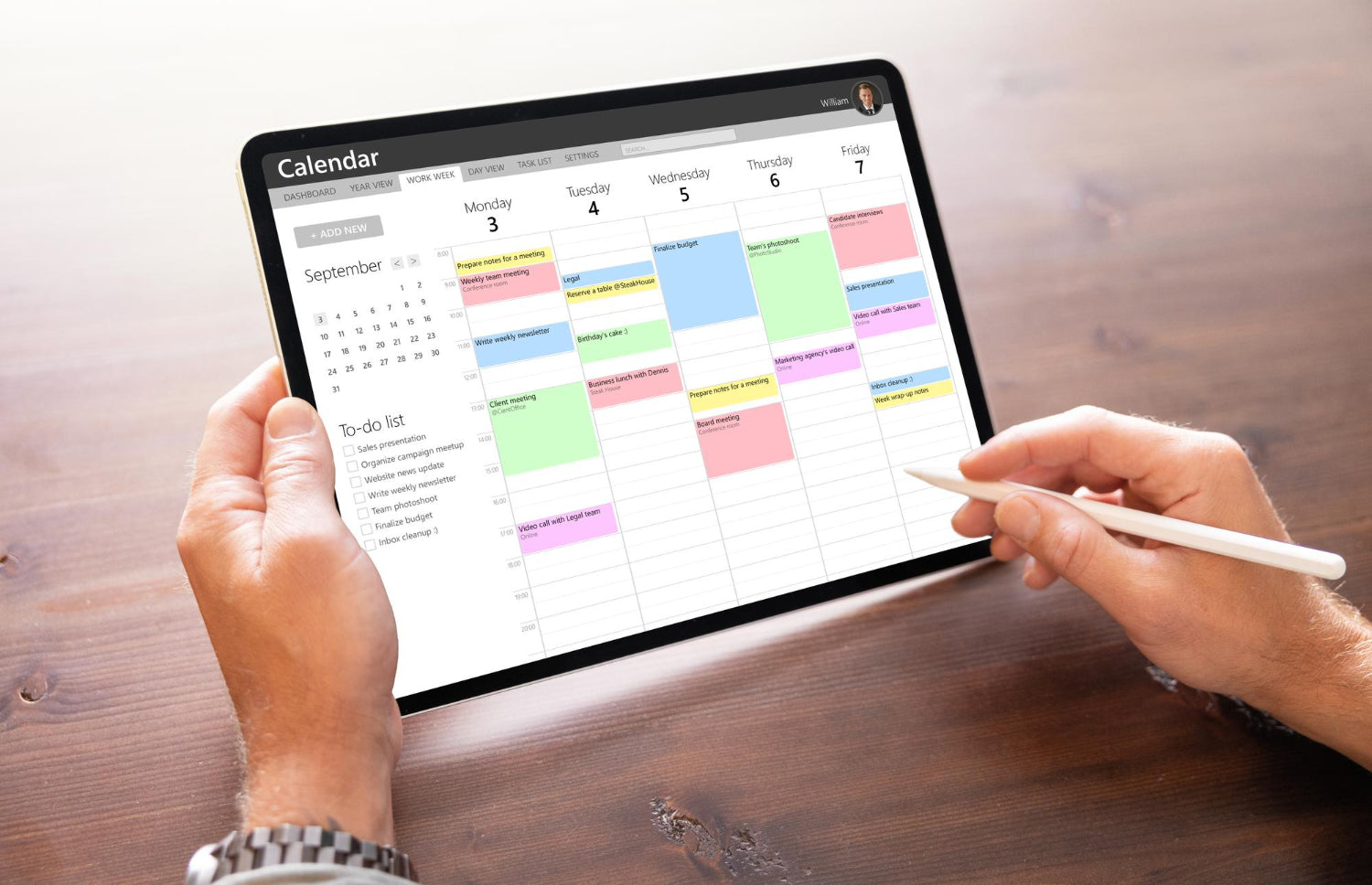

A diary is a tool that many entrepreneurs use to manage their work, organize meetings, and stay productive. Its surprising though, how many people don’t use their diary to it’s full potential! I want to change that and show you the power of the diary for productivity. In the below guide, I give tips on managing your diary effectively and show you why this matters.
Why Diary Management Matters
You may wonder why I’m making a fuss about diary management but it’s especially important and can greatly improve your working life. Managing your diary effectively allows you to:
- To make sure you don’t miss engagements.
- To manage your time effectively.
- To plan ahead.
- To prepare effectively for upcoming events.
- To maintain a professional working environment.
Once you get into good habits, you will find your diary infinitely useful and it will help you remain productive and disciplined as an entrepreneur.
7 Tips to Manage Your Diary Effectively

1. Color coding is your friend!
Most diaries have the ability to color code entries. This is incredibly useful as that small visual indicator helps distinguish between different tasks. For my own diary, I have created a list of entry types and each one has a specific color.
For example, video calls are green, face to face meetings are red, and email deadlines are blue. Using color coding in this manner improves the effectiveness of your diary entries no end and it helps you plan beforehand.
2. Don’t be afraid to make diary entries detailed
Let’s look at two examples. One diary entry simply states “Meeting – 10am”. The other one states “Meeting – 10am – With X customer to discuss contract renewal and new business terms for 2024”. Which one is better?
Clearly the second entry. The first entry literally gives you nothing and it does nothing to contribute towards your productivity – it only serves the bare minimum in giving you a reminder for the meeting.
The second entry shows who the customer is and gives a summary of the meeting’s purpose. With this info you can prepare adequately and know what you need to do before the meeting.
My point is, make your diary entries as detailed as you like! The more detail, the more you can prepare and make use of your diary.

3. Schedule a regular backup of your diary
Imagine you go to open your diary on your computer and you find that the underlying file has corrupted – disaster. This means that you’ve lost all you entries and the schedule for your upcoming weeks (and potentially months) is gone.
This is why I always backup my diary on a weekly basis! Some diary software allows you to do this and oftentimes you can create a cloud backup so that if something does happen or a file gets corrupted, you can still always reload it and have access to your entries.
Ideally, you should use diary software or an app that allows you to access your planner on multiple devices. This means that you can still open it if you don’t have your laptop with your for example and you need to make a new entry.
Alternatively you could also keep a note of important meetings on your desk pad, At least you've got a fall back in-case your electronic diary does fail.
4. Don’t leave diary planning until the last minute
The point of a diary is to be prepared and have a clear schedule for the upcoming weeks, right? So why do people still only update their diary and plan it hours before things are meant to happen!
Plan your diary in advance! Ideally, you should have your diary pre-planned weeks or even months ahead where possible. Obviously, this isn’t always applicable as you may get last-minute calls or meetings arranged, but where possible, any forward date or appointment you have should be listed in your diary the minute you are aware of it.
5. Set reminders with physical pop-ups or notifications
Part of utilizing your diary is checking it daily but what happens if you forget to do this and you miss a call or a meeting or forget to reply to an email on time?
There is a simple way to eliminate errors like this – by using notifications. Most diary software has the ability to allow notifications. These could be desktop notifications in your toolbar, pop-ups in your web browser, SMS messages to your smartphone, or app notifications.
By setting notifications for events in your diary you can make sure that you never miss anything. You’ve got to remain discipline though and resist the urge to turn the notifications off when they start to annoy you!

6. Respond to events such as meeting invitations immediately
How many times have you received an invite to a meeting only to let it languish in your inbox or diary for weeks to eventually forget about it and miss the event? We’ve all done it but it’s easily avoidable simply by being proactive.
As soon as you get an event in your diary that you have to RSVP too, do it straight away! Reply to the event with your response and add it into your diary together with a notification reminder. It’s done and dusted then and you are guaranteed not to forget it!
7. Be aware of different time zones
If you work globally and deal with people from multiple time zones you have to account for this in your diary. For example, perhaps one of your suppliers has requested a voice call at 16:00 on Tuesday. So, you set the diary entry to 16:00 GMT on Tuesday as per your time zone…
However, the supplier is based in India and they actually meant 16:00 IST which is 5h30 ahead of you! This means that for you, the meeting was at 10:30am and you’ve missed it! Make sure that you account for time zones and that everyone involved in calls and meetings is on the same page.
Create the Ultimate Diary to Stay Productive and Manage Your Time
With these tips you should be able to manage your diary effectively and use it to its fullest potential. This means no more missed calls, plenty of time for planning, and an effective work routine where everything is under control and organized.
